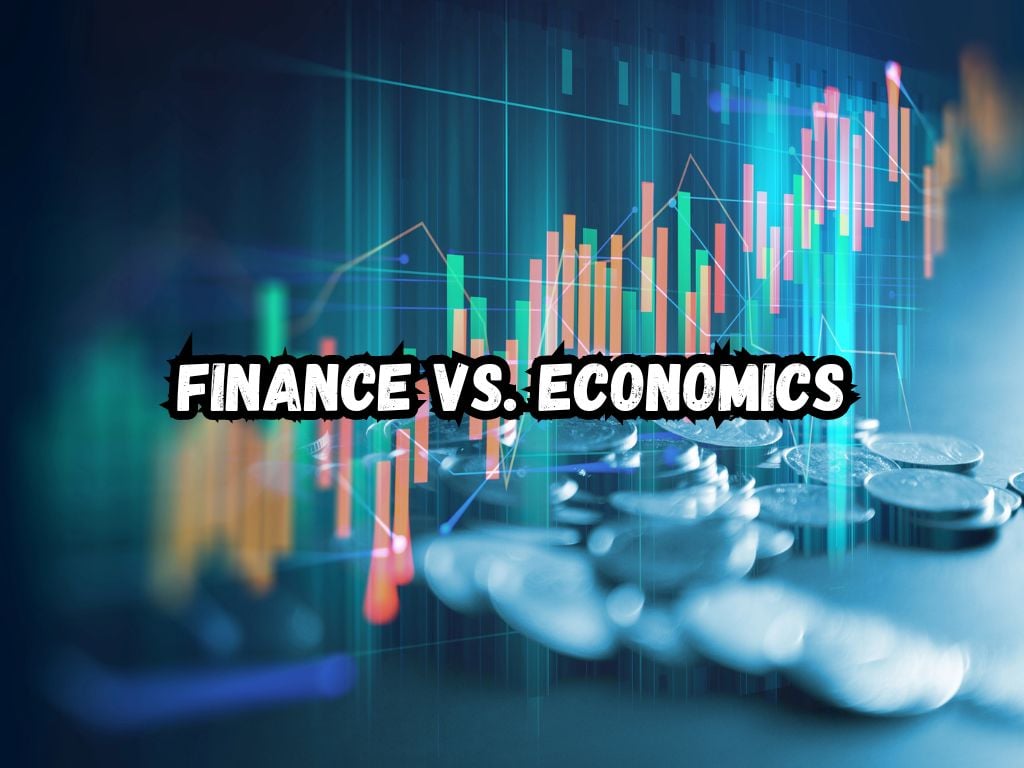Finance and economics are two distinct disciplines that underpin the vast spectrum of the financial and business world.
Their importance can’t be overstated, whether you’re navigating personal finances, making corporate decisions, or understanding global market trends. Let’s look at the comparison of finance vs economics.
The Realm of Finance
Finance focuses on how individuals, businesses, and governments allocate resources over time, within conditions of certainty and uncertainty.
It encompasses three main areas: personal finance, where it’s all about managing individual or family finances; corporate finance, dealing with how corporations handle their funding and investment strategies; and public finance, focusing on government expenditures and taxation.
At the heart of finance lie a few critical concepts. The time value of money, a principle asserting that a dollar today is worth more than a dollar tomorrow, underpins many financial decisions.
Risk and return are also pivotal, guiding investment choices with the basic premise that higher risk demands higher potential returns. Financial markets and instruments, including stocks, bonds, and derivatives, are the playing fields where these decisions come to life.

Exploring Economics
Economics, with its broad scope, examines how societies utilize scarce resources to produce goods and services and distribute them among different people.
Its bifurcation into microeconomics and macroeconomics allows a detailed analysis of individual, household, and firm behavior on one end (microeconomics) and broader economic phenomena like inflation, unemployment, and economic growth (macroeconomics) on the other.
Economics introduces several core concepts essential for anyone trying to decode the world’s economic puzzles. Supply and demand, the backbone of market economies, explains how prices emerge in market settings.
Elasticity shows how responsive quantities demanded or supplied are to changes in prices or income. Market equilibrium and economic indicators like Gross Domestic Product (GDP), inflation rates, and unemployment rates offer crucial insights into economic health and trends.
Finance vs Economics: A Comparative Look
While finance and economics occasionally tread common ground, especially in areas like financial economics, they differ significantly in scale, focus, and methodology.
Finance delves into managing funds effectively across different contexts, while economics broader scope examines production, consumption, and the distribution of goods and services.
Finance often employs models to assess investments or value securities, whereas economics focuses on theoretical frameworks and empirical data to understand and predict behavior and outcomes.
The Intersection in Everyday Life
The relevance of finance and economics extends beyond academic or professional spheres into daily life and business operations.
In finance, understanding investment principles can inform personal saving and investing decisions. For businesses, finance is crucial for strategic planning, budgeting, and managing operational costs.
Economics offers insights into market dynamics, consumer behavior, and the implications of government policies, vital for making informed business choices and understanding economic trends that affect personal and professional realms.
Career Paths and Education
Careers in finance vary from financial analysts and planners who guide investment decisions to investment bankers who manage corporate financing.
In contrast, economics graduates might become economists, policy advisors, or research analysts, tackling broader economic issues and policies.
Pursuing these careers typically requires specialized education. Finance roles often demand degrees in finance, business, or accounting, with an emphasis on analytical and quantitative skills.
Economics positions may require advanced degrees emphasizing economic theory, statistics, and econometrics.

Frequently Asked Questions
Which is better for a career in the stock market – finance or economics?
Finance is generally better for a career in the stock market as it focuses directly on financial markets, investment strategies, and securities analysis, all essential for stock market roles.
Can economists work in financial institutions?
Yes, economists can work in financial institutions where they analyze economic trends, advise on policy or investment strategy, and help in forecasting financial markets.
How do the principles of economics apply to personal finance?
Economics principles like supply and demand, cost-benefit analysis, and market theory can help individuals make informed decisions about spending, saving, and investing.
Is it important for a business owner to study both finance and economics?
Yes, studying both finance and economics is crucial for business owners to manage financial resources efficiently and understand market conditions and economic indicators that affect their business.
What are some common software tools used by professionals in finance and economics?
Common software tools include Excel for data analysis, Stata and SPSS for statistical analysis, and MATLAB for more complex quantitative analyses.
How do global events impact the fields of finance and economics differently?
Global events can directly affect financial markets, causing volatility in stock and bond prices, while impacting economics by influencing macroeconomic indicators like GDP, unemployment, and trade balances.
Conclusion
Both finance and economics are pivotal in understanding and navigating the complex web of global finance and business. While distinct in scope and focus, their intersection offers valuable insights for making informed decisions in both personal and professional realms.


 Tags:
Tags:










